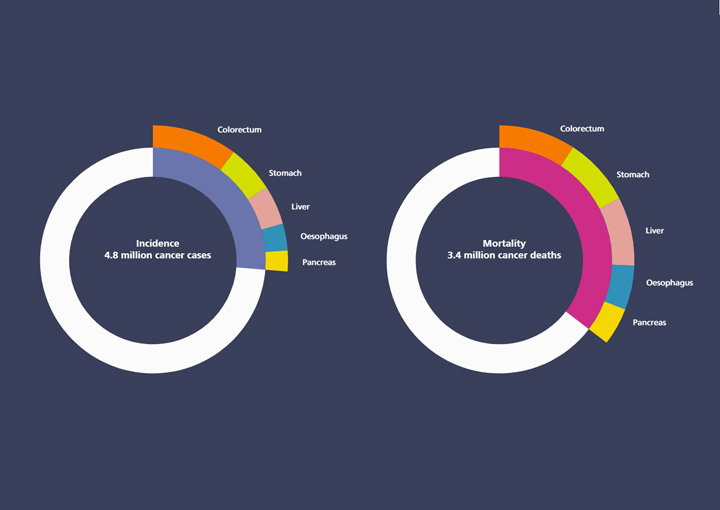
March is Colorectal Cancer Awareness Month. The International Agency for Research on Cancer (IARC) estimates that in 2020 colorectal cancer was the third most commonly diagnosed cancer type in the world, with almost 2 million new cases. It was the third most common cancer in men but the second most common cancer in women, after breast cancer. Colorectal cancer was also the second most common cause of cancer death worldwide, causing almost 1 million deaths.
You can reduce your risk of developing colorectal cancer by adopting healthier lifestyle habits. Recognized risk factors for colorectal cancer include obesity, low levels of physical activity, a poor diet, and tobacco smoking. Alcohol consumption is also a known risk factor for colorectal cancer.
Increased intake of fruit and vegetables is associated with a lower risk of developing colorectal cancer, whereas a dietary pattern typical of industrialized countries, with high intakes of red meat, processed meat, and eggs, is associated with an increase in colorectal cancer risk. By changing your diet to include more fruit and vegetables and less meat, particularly processed meat, you can reduce your risk of colorectal cancer.
Obesity and physical inactivity increase the risk of colon cancer. Higher levels of physical activity are associated with a lower risk of developing colorectal cancer. Introducing more physical activity into your daily routine, even in small ways such as walking or cycling to work or climbing the stairs instead of using the lift, can also reduce your risk of colorectal cancer.
Tobacco smoking and alcohol consumption also increase the risk of colorectal cancer. Quitting smoking and reducing or avoiding alcohol consumption are important steps in reducing your risk of developing colorectal cancer.
Adopting some or all of these healthier habits can help you improve your general health and reduce your risk of many other diseases, not just colorectal cancer. However, even people without any exposure or with very low exposure to known risk factors can still develop this disease. This is why people who are invited to attend colorectal cancer screening should accept. Colorectal cancer screening is available in many countries and aims to reduce the risk of death through early detection of colorectal cancer or of precursor lesions of colorectal cancer.
Watch video with Dr Béatrice Lauby-Secretan
Dr Béatrice Lauby-Secretan on evaluating methods of colorectal cancer screening
In this video, Dr Béatrice Lauby-Secretan of the Evidence Synthesis and Classification Branch at IARC explains how the IARC Handbooks of Cancer Prevention programme evaluated the effectiveness of colorectal cancer screening methods in reducing colorectal cancer incidence and mortality. This information enables governments and public health organizations to take action against this disease in the most effective way.
Dr Béatrice Lauby-Secretan, Scientist, Evidence Synthesis and Classification Branch
Watch video with Dr Elom Aglago – English
IARC study shows eating fish regularly can reduce your risk of developing colorectal cancer
In this video, Dr Elom Aglago, a postdoctoral scientist in the Nutrition and Metabolism Branch at the International Agency for Research on Cancer (IARC), presents the findings of a study on whether regularly eating fish has an effect on a person’s risk of developing colorectal cancer.IARC estimates that in 2020 colorectal cancer was the third most commonly diagnosed cancer type in the world, with almost 2 million new cases. Colorectal cancer was also the second most common cause of cancer death worldwide, causing almost 1 million deaths.
Dr Elom Aglago, Postdoctoral Scientist, Nutrition and Metabolism Branch
Watch video with Dr Elom Aglago – French
Cancer colorectal – la consommation de poisson réduit le risque de développer le cancer colorectal
Dans cette vidéo, Dr Elom Aglago présente les résultats d’une étude qui cherchait à comprendre la relation entre la consommation régulière de poisson et le risqué de développer un cancer colorectal. Le Centre international de recherche sur le cancer (Circ) estime qu’en 2020 le cancer colorectal était le troisième cancer le plus fréquent au monde, avec 2 millions de nouveaux cas diagnostiqués. Le cancer colorectal provoquait un million de mort en 2020, selon le CIRC.Dr Elom Aglago, Chercheur postdoctoral, Branche Nutrition et Metabolisme
Visit the Gastrointestinal Cancers webpage
Cancer Stories – Gastrointestinal Cancers webpage
The International Agency for Research on Cancer (IARC) has launched a new data visualization tool for gastrointestinal cancers as part of the Cancer Stories portal on the IARC Global Cancer Observatory website. Cancer Stories are interactive stories telling cancer facts through visualizations. Read news item.
View IARC Handbooks of Cancer Prevention Volume 17: Colorectal Cancer Screening

